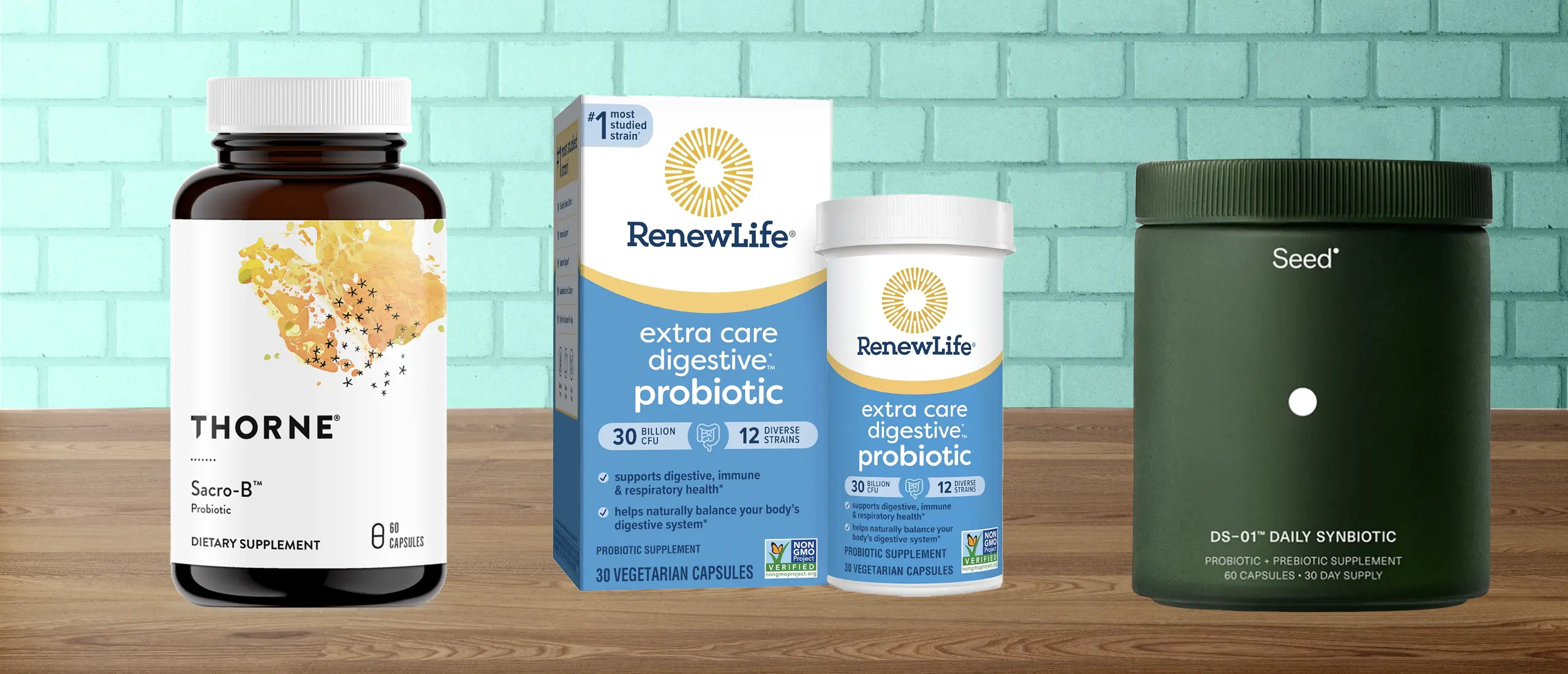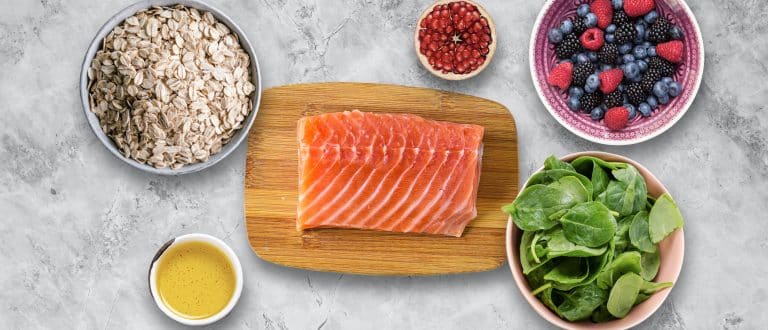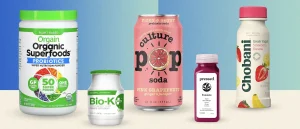How to Choose the Best Probiotics to Take With Antibiotics, According to an R.D.
- By Rebekah Harding
- April 11, 2024
Our product recommendations are selected by editors, tested first-hand, or expert-approved. We may earn a commission through links on our site.
30-Second Takeaway
- Antibiotics can kill good and bad bacteria, which can harm your microbiome and cause symptoms like diarrhea.
- Research shows that taking a probiotic during your course of antibiotics can prevent microbiome damage and prevent GI discomfort.
- Look for a probiotic that has adequate CFUs and gut-supporting strains of bacteria like Lactobacillus, Bifidobacterium, Bacillus, or Saccharomyces boulardii.
W
hen you have strep throat or a respiratory infection, your doctor will likely send you home with a course of antibiotics. But trading your bacterial infection for GI discomfort from an antibiotic-damaged microbiome—when you just want to start feeling better—can be frustrating. Why does this happen?
“When you take antibiotics, the medication doesn’t recognize the good bacteria from the bad,” explains Eva De Angelis, R.D.N. “This means that while antibiotics are crucial for removing harmful pathogens when you have an infection, they can also wipe out our beneficial bacteria and hurt our gut microbiota.”
Research shows that taking a probiotic—a supplement that reintroduces strains of good bacteria back into your microbiome—can help heal your gut and protect your microbiome during a course of antibiotics (1). Below, two dietitians weigh in on the best probiotics to take with antibiotics to protect and repair your microbiome, so you can focus on feeling better.
About the Experts:
Kelsey Costa, M.S., R.D.N., is a registered dietitian nutritionist, certified wellness coach, and author. She is the founder and CEO of Dietitian Insights, a media and consulting company.
Eva De Angelis, R.D.N., is a registered dietitian nutritionist at the E-Health Project. She specializes in using food and nutrition to manage chronic disease.
Why You Should Take Probiotics With Antibiotics
Protects microbiome balance
Think of your microbiome as a bustling community of tiny organisms that live in your gut, including bacteria, yeast, and viruses (2). These organisms play a role in your mood, digestion, and immunity—which means your health can suffer if your microbiome is thrown out of balance.
Research shows that your microbiome can remain out of balance for up to two years after antibiotics (1). This imbalance is linked to an increased risk of conditions like obesity, diabetes, inflammatory bowel disease, depression, asthma, and rheumatoid arthritis (3).
Antibiotics can reduce the good bacteria from the Firmicutes phylum, which ferments fiber and keeps your digestive system healthy (4, 1). On the flip side, antibiotics can boost the numbers of Proteobacteria, which can throw off the balance in your gut and lead to health issues (5).
While doctors previously believed that starting probiotics during antibiotic treatment could throw off your microbiome, a 2022 review in the Journal of Medical Microbiology found that probiotics are an effective way to prevent gut damage and preserve good bacteria (1).
Prevents GI discomfort
According to Kelsey Costa, R.D.N, an unbalanced microbiome (dysbiosis) can lead to uncomfortable symptoms like gas, bloating, diarrhea, and constipation. In fact, up to 35 percent of people who take antibiotics will experience these gut symptoms (6).
But research shows that starting probiotics alongside antibiotics can prevent discomfort in the first place.
According to the Journal of Medical Microbiology review, five out of seven studies found that people who took probiotics during the course of treatment had fewer gastrointestinal symptoms from antibiotics (1).
How to Choose the Best Probiotics to Take With Antibiotics
Not all probiotics are created equal when staving off gut discomfort from antibiotic use. Consider these factors when you’re skimming the supplement aisle, per Costa and De Angelis.
Strains of bacteria
Your gut microbiome boasts around 1500 different species of bacteria (7). But not all probiotic strains pack the same punch for treating gut irritation post-antibiotics, according to Costa.
Look for well-studied strains of probiotics like Lactobacillus, Bifidobacterium, Bacillus, or Saccharomyces boulardii, she recommends.
“[In particular], both Lactobacillus rhamnosus GG (LGG) and Saccharomyces boulardii have been found to significantly lower the risk of antibiotic-associated diarrhea (8),” says Costa.
Colony forming units (CFUs)
What type of beneficial bacteria you’re introducing to your microbiome is only part of the equation. How many bacteria are living in your probiotics matters, too.
A dose of probiotics is measured in colony-forming units (CFUs), which estimates the number of microbial cells that are healthy enough to reproduce in your gut (8).
Costa points to a 2017 review, which suggests that a dosage of 10 billion colony-forming units (CFU) per day is the minimum you’ll need to reduce your risk of diarrhea from antibiotics (9).
Acid resistance
Popping a probiotic is only half the battle. The beneficial bacteria also have to survive the acid in your stomach in order to colonize your digestive tract and make a difference in your gut health (10).
Some probiotics are formulated with acid-resistant or extended-release capsules, which give the vulnerable bacteria more of a fighting chance.
When Is the Best Time to Take Probiotics With Antibiotics?
According to Costa, starting probiotics within two days of starting antibiotic treatment can lower your likelihood of having GI symptoms like diarrhea.
Ideally, you should space out your probiotics from your antibiotic dose to preserve the effectiveness of the probiotics. For example, if you’re taking a dose of antibiotics with breakfast and dinner, take your probiotics during lunch or at least two hours from an antibiotic dose.
After you finish your course of antibiotics, it’s a good idea to keep taking your probiotics for at least a few weeks to support the restoration of your gut flora (1).
But you don’t have to reserve your probiotics for when you have to take antibiotics. Research shows that taking probiotics consistently may also support your immune system, digestive health, and more (11, 12).
The 8 Best Probiotics to Take With Antibiotics, Ranked
References
1 Fernandez, et al (2022). Effect of adding probiotics to an antibiotic intervention on the human gut microbial diversity and composition: a systematic review.
2 National Human Genome Research Institute. Microbiome.
3 Patangia, et al (2022). Impact of antibiotics on the human microbiome and consequences for host health.
4 Sun, et al (2022). Gut firmicutes: Relationship with dietary fiber and role in host homeostasis.
5 Shin, et al (2015). Proteobacteria: microbial signature of dysbiosis in gut microbiota.
6 McFarland (2008). Antibiotic-associated diarrhea: epidemiology, trends and treatment.
7 Conz, et al (2023). Effect of Non-Nutritive Sweeteners on the Gut Microbiota.
8 National Institutes of Health. Probiotics.
9 Blaabjerg, et al (2017). Probiotics for the Prevention of Antibiotic-Associated Diarrhea in Outpatients—A Systematic Review and Meta-Analysis.
10 Koga (2022). Microbiota in the stomach and application of probiotics to gastroduodenal diseases.
11 National Center for Complementary and Integrative Health. Probiotics: What You Need To Know.
12 Mazziotta, et al (2023). Probiotics Mechanism of Action on Immune Cells and Beneficial Effects on Human Health.
13 Capurso, et al (2019). Thirty Years of Lactobacillus rhamnosus GG: A Review.
14 Szajewska, et al (2015). Systematic review with meta-analysis: Lactobacillus rhamnosus GG in the prevention of antibiotic-associated diarrhoea in children and adults.
15 Sielatycka, et al (2023). Dynamics of Active Fluorescent Units (AFU) and Water Activity (aw) Changes in Probiotic Products-Pilot Study.
16 McFarland (2021). Efficacy of Single-Strain Probiotics Versus Multi-Strain Mixtures: Systematic Review of Strain and Disease Specificity.
17 Natural Products Association. Federal GMPs for Dietary Supplements.
18 Asbury, et al (2022). Prebiotic Mannan-Oligosaccharides and Their Role in the Gut Microbiota.
19 Kiani, et al (2020). Bacteriophages in food supplements obtained from natural sources.












